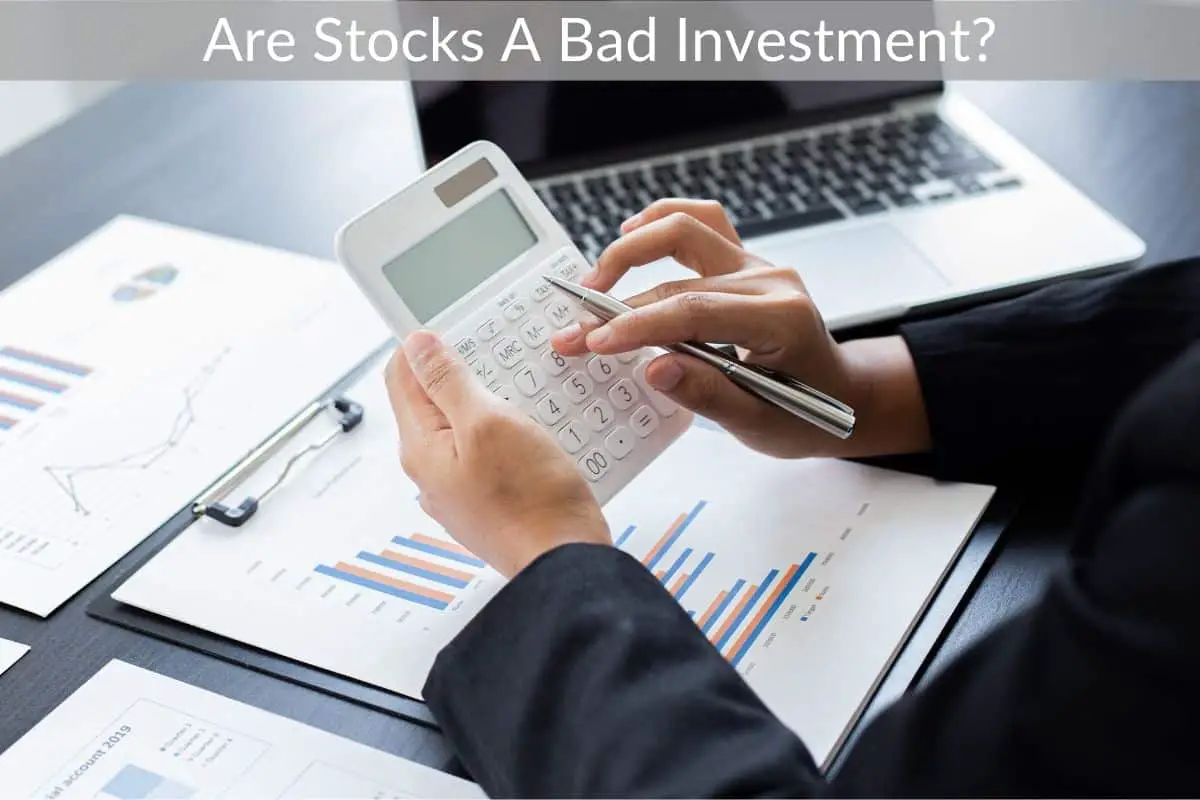Table of Contents
*This post may contain affiliate links. As an Amazon Associate we earn from qualifying purchases.
When you have funds to invest, it’s important to invest it wisely. One of the primary investment avenues out there is the stock market.
But, are stocks a bad investment?
Generally speaking, stocks are not a bad investment if you’re knowledgeable enough to do the research and monitoring necessary to invest in the right stocks.
However, the market can be volatile so a return on your investment is not guaranteed and it’s not a good idea to invest in stocks unless you can leave the funds invested for many years.
If you’re on the fence when it comes to whether or not you should invest in stocks, I’m here to help provide guidance so you can make an informed decision.
Are Stocks A Bad Investment?
Investing in the stock market can offer several benefits, including the potential to earn dividends or an average annualized return of 10% or more (on average over many years).
However, the stock market can be volatile, so returns are never guaranteed and one year could be up massively while the next is down a ton.
You can decrease your investment risk by diversifying your portfolio based on your financial goals and also by regular investing over time.
Stock Investing Pros And Cons
What are the pros and cons of investing in the stock market?
Historically, the stock market has delivered generous returns to investors over time, but it also goes down, presenting investors with the possibility for both profits and loss; for risk and return.
Pros
- Grow with economy
- Stay ahead of inflation
- Easy to buy and sell
Cons
- Risk losing it all
- Takes time to research
- Emotional ups and downs
5 Benefits Of Stock Investing
Stock investment offers plenty of benefits to you as an investor. These benefits are important to understand before you ever put any money into stocks.
1. Takes Advantage Of A Growing Economy
As the economy grows, so do corporate earnings. That’s because economic growth creates jobs, which creates income, which creates sales.
The fatter the paycheck, the greater the boost to consumer demand, which drives more revenues into companies’ cash registers.
It helps to understand the phases of the business cycle—expansion, peak, contraction, and trough.
2. Best Way To Stay Ahead Of Inflation
Historically, stocks have averaged an annualized return of 10% or more over long periods of time.
That’s better than the average annualized inflation rate. It does mean you must have a longer time horizon, however.
That way, you can buy and hold even if the value temporarily drops.
3. Easy To Buy
The stock market makes it easy to buy shares of companies. You can purchase them through a broker or a financial planner, or even online.
Once you’ve set up an account, you can buy stocks in minutes. Some online brokers, such as Robinhood, let you buy and sell stocks commission-free.
4. Make Money In Two Ways
Most investors intend to buy low and then sell high.
They invest in fast-growing companies that appreciate in value. That’s attractive to both day traders and buy-and-hold investors.
The first group hopes to take advantage of short-term trends, while the latter expect to see the company’s earnings and stock price grow over time.
They both believe that their stock-picking skills allow them to outperform the market.
Other investors prefer a regular stream of cash. They purchase stocks of companies that pay dividends. Those companies grow at a moderate rate.
Both are good options and both allow you to make money via the stock market if you are correct in picking the companies you invest in.
5. Easy To Sell
The stock market allows you to sell your shares of a stock at any time.
Economists use the term “liquid” to mean that you can turn your shares into cash quickly and with low transaction costs.
That’s important if you suddenly need your money. Since prices are volatile, you run the risk of being forced to take a loss.
5 Disadvantages Of Stock Investing
As with anything there are advantages and disadvantages to stock investing. I covered the advantages up above and now I will cover the disadvantages.
1. Risk
You could lose your entire investment. If a company does poorly, investors will sell, sending the stock price plummeting.
When you sell, you could lose your entire initial investment (although that’s unlikely) If you can’t afford to lose all or a portion of initial investment, then you should not buy stocks.
That’s why it’s so important to have a long time frame for the money you put into stocks as the stock, ETF, or mutual fund that you invest in could easily drop a few hours or days after you purchase it.
You do get an income tax break if you lose money on your stock loss. You also have to pay capital gains taxes if you make money.
2. Time
If you are buying stocks on your own, you must research each company to determine how profitable you think it will be before you buy its stock.
You must learn how to read financial statements and annual reports and follow your company’s developments in the news.
You also have to monitor the stock market itself, as even the best company’s price will fall in a market correction, a market crash, or bear market.
3. Emotional Roller Coaster
Stock prices rise and fall second-by-second during the trading day. Individuals tend to buy high, out of greed, and sell low, out of fear.
The best thing to do is not constantly look at the price fluctuations of stocks, and just be sure to check in on a regular basis.
4. Professional Competition
Institutional investors and professional traders have more time and knowledge to invest.
They also have sophisticated trading tools, financial models, and computer systems at their disposal. It can seem difficult if not impossible to try to gain an advantage as an individual investor.
This is why many people invest in index funds or index ETFs instead of individual stocks. With an index or ETF someone else does the stock picking and you just consistently put money in that fund or ETF.
5. Stockholders Paid Last
Preferred stockholders and bondholders or creditors get paid first if a company goes entirely broke.
But that happens only if a company goes bankrupt. A well-diversified portfolio should keep you safe if any company goes under.
Diversify To Lower Investment Risk
There are ways to reduce your investment risk, such as by diversifying:
- By investment type: A well-diversified portfolio will provide most of the benefits and fewer disadvantages than stock ownership alone. That means a mix of stocks, bonds, and commodities.
Over time, it’s the best way to gain the highest return at the lowest risk.By company size: There are large-cap, mid-cap, and small-cap companies.
The term “cap” stands for “capitalization.” It is the total stock price times the number of shares. It’s good to own different-sized companies, because they perform differently in each phase of the business cycle.
- By location: Own companies located in the United States, Europe, Japan, and emerging markets. Diversification allows you to take advantage of growth without being vulnerable to any single stock.
- Through mutual funds: Owning mutual funds allows you to own hundreds of stocks selected by the mutual fund manager. One easy way to diversify is through the use of index funds or index ETFs.
Final Thoughts
So…are stocks a bad investment?
Stocks can be a fantastic way to see a return on investment but it requires a lot of time and effort. Online brokers like Robinhood and Fidelity make the process a lot easier and inexpensive though.
With zero commissions on trades and no sign up fees, you can start investing in minutes.
The key here is to understand stock investing comes with a high level of risk. The trick is to mitigate that risk through the means I’ve listed above.

